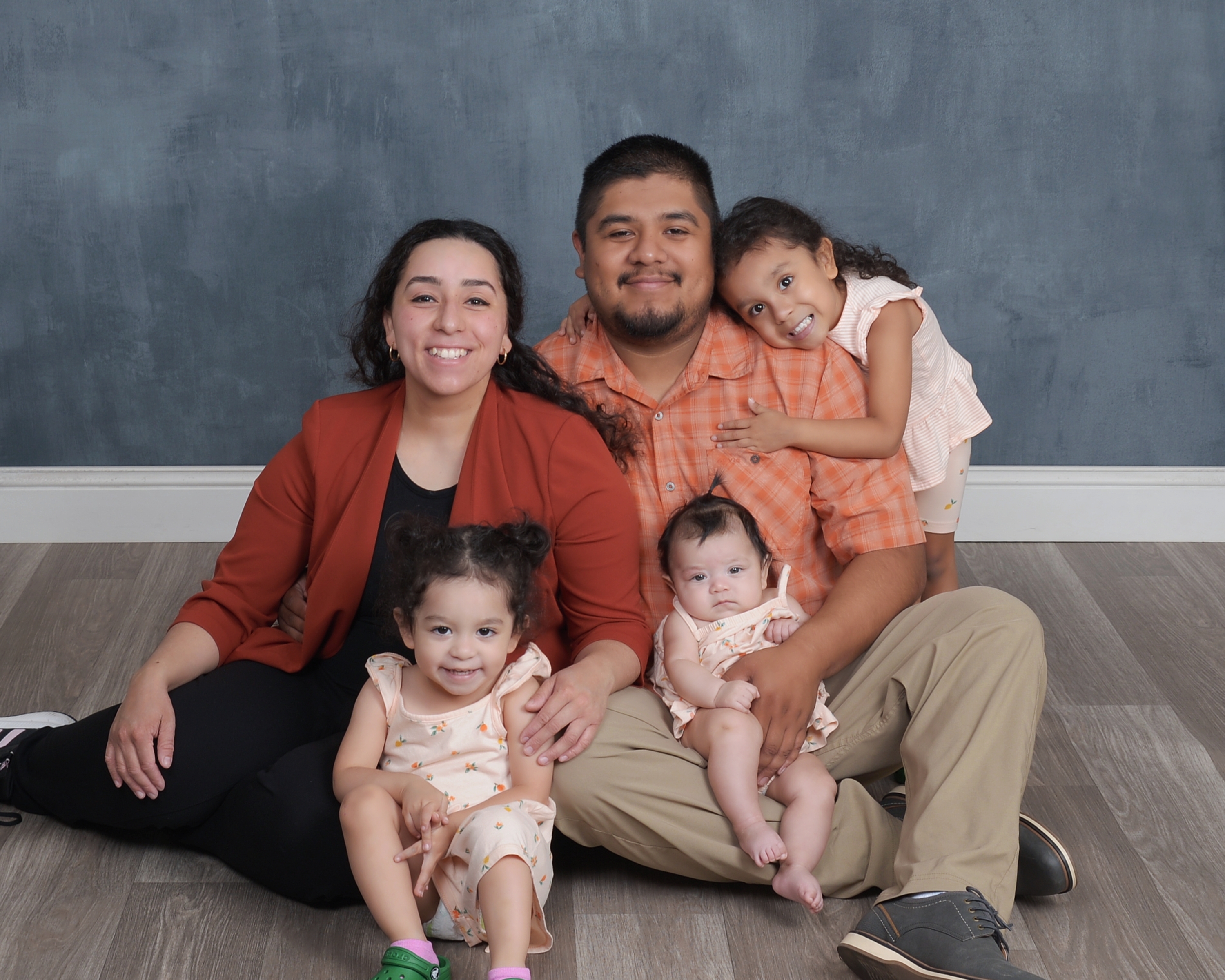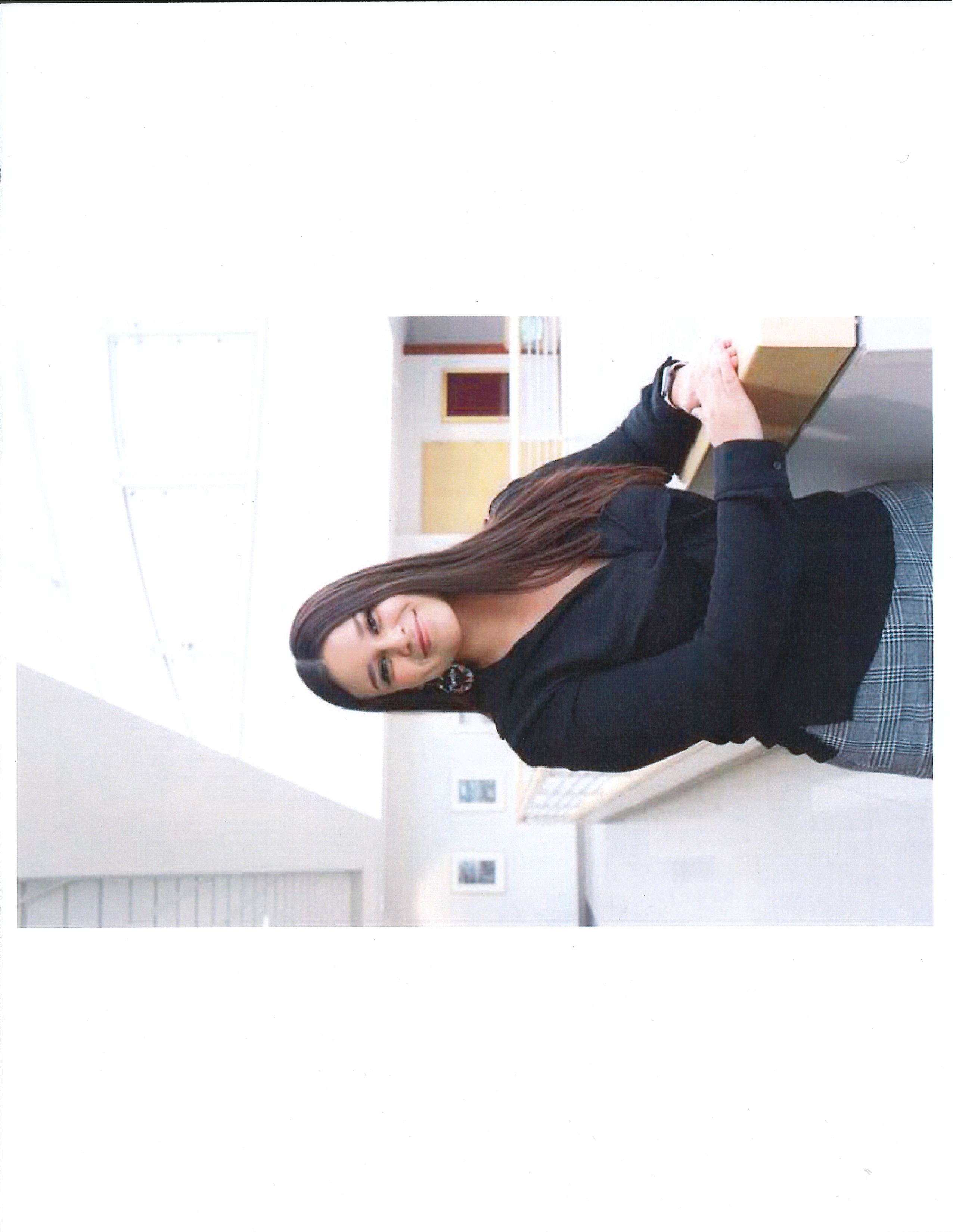
Alejandra Carranza (left) with her partner Ramiro and daughters Leonila (hugging Ramiro), Aislinn, and baby Eowyn. Student Support Services staff helped coach Alejandra when she was in labor with Leonila.
Alajandra Carranza
From the classroom to the delivery room: WSU TRIO staff had her back
By Steve Nakata, Student Affairs
Student Support Services Program (SSS) staff on the Washington State University Pullman campus are like a second family to alum Alejandra Carranza. So much so that when she learned she was pregnant with her first child as a WSU student, they were the first to hear the news after talking with her partner.
“I was so scared about how the pregnancy was going to impact my educational journey, and I had no idea what to expect,” Carranza said. “SSS felt like a safe place for me where I could share my feelings and receive the kinds of support I needed.”
Student Support Services is a federally funded TRIO program that provides students with academic support and opportunities for personal development. Its primary goal is to help students succeed and graduate from college.
After completing the SSS program, Carranza worked for several years as a student office assistant in WSU’s Office for Access and Opportunity, which oversees SSS and other federally funded support programs in Student Affairs. It was during her shift there that she began to feel her first contractions.
“Angie (Klimko) and Carrie (Bullock-Ben-Yisrael) from the office followed me to the hospital, and since I hadn’t taken a birthing class, they helped coach me through the entire process,” Carranza said.
Klimko, director of WSU’s First at WSU and First-generation Initiatives, and Bullock Ben-Yisrael, director of SSS, went above the call of duty that day, Carranza said, but it is an example of the strong relationships that develop in SSS.
Feeling understood and safe
Carranza did not realize how much she would need extra support when she first came to WSU in 2015. She grew up in a migrant and seasonal farmworker family and picked blueberries, raspberries, cherries, and apples in the Lynden, Washington, area. It was hard work, and her hands and feet suffered nerve damage due to the harsh working conditions. At one point to help make ends meet her mom made tamales and Carranza went with her door to door selling them in her neighborhood.
“Some kids made fun of me at school, and it was a very difficult time,” she said. “I knew I didn’t want to pick fruit for the rest of my life, and that I was going to find a way to go to college.”
Carranza graduated at the top of her class and secured over a dozen scholarships to help fund her dream of going to WSU. When she arrived on campus, she first got into the College Assistance Migrant Program (CAMP), a federally funded program designed to assist children from migrant and seasonal farm working families. CAMP played a big role in helping her start college on the right foot. She then joined SSS to continue expanding her support network.
After applying for the program, she remembers sitting in Klimko’s office and sharing stories about her struggles growing up. The weight of her experiences caused her to cry, yet she felt safe and supported and let her feelings flow.
“After hearing me speak, Angie told me she knick-named me ‘Diamond’ because diamonds are formed by a lot of pressure, yet turn into something very beautiful,” Carranza said. “That meant a lot to me and still does.”
Paying it forward
Carranza keeps in contact with SSS, which exposed her to excellent role models during a time in her life when she needed them the most. Now, as a student achievement specialist for the Gear up Program at WSU Tri-Cities, she is serving as a positive role model for the kids in her community. Gear up, also a federally funded program, helps middle and high school students from disadvantaged backgrounds succeed in school and prepare for college.
“Student Support Services played a big role in my life and helped shape me into the person I am today,” Carranza said. “I’m so grateful for them and everyone at WSU who helped me along the way.”

Elizabeth Mariscal
TRIO program provides lasting connections of support
By Steve Nakata, Student Affairs
Washington State University High School Equivalency Program (HEP) Instructor Elizabeth Mariscal gets emotional when she recounts her final weeks as a student at WSU. She was living in Spokane, Washington, completing her student teaching when the stress of her situation came crashing down upon her.
As if student teaching, a non-paying position, didn’t keep her busy enough, she spent her evenings and weekends working in retail and at a call center to make ends meet. No matter how hard she tried, she felt like she was falling short helping her students and putting food on her table.
“I got to the point where I felt so burnt out, like a lime that was so squeezed nothing else could come out,” Mariscal said. “I was broken.”
Having nowhere else to turn, she reached out to Nancy Hernandez, an academic coordinator and retention specialist in WSU Pullman’s TRIO Student Support Services (SSS) Program, almost in an act of desperation. The program was key to her success while she studied in Pullman, but she didn’t expect it could do anything for her in Spokane.
“I was so surprised when she provided me a list of resources local to me” Mariscal said. “Her encouragement gave me the emotional boost I needed to complete my student teaching and make it to the graduation stage.”
Journey started in the fields
Graduating from WSU in 2022, and her subsequent hiring in HEP, was the culmination of a long journey for Mariscal. She grew up in Brewster, Washington, a small town located on the shores of Lake Pateros. There her father served as a crew boss in the orchards and her mom worked in fruit packing sheds.
For as long as she remembers Mariscal worked odd jobs to help pay for college so not to burden her family. As she approached her 16th birthday, she was hired to carry buckets of cherries just picked from the trees to the storage bins.
“I remember wildfires burning nearby, when I shook the tree branches, white ash fell from the trees just as if it had snowed,” Mariscal said. “We were out there working in the smoke and none of us were given a mask to wear.”
The packing warehouses are not any better, she said, as workers still brave cold indoor temperatures and are made to stand on concrete floors for up to 10 hours a day. Her parents wanted a better life for their children and encouraged them to go to college.
TRIO presentation ‘commanded’ attention
Mariscal’s first trip to WSU came when she was just nine years old. She accompanied her parents and her older sister Janette who participated in La Bienvenida, an orientation program for Spanish-speaking families. The people they met at WSU made quite an impression on them, and it is something that stuck with Mariscal until it was her turn to attend WSU years later.
La Bienvenida taught Mariscal that many programs and services exist on campus to help students like her transition to WSU. She enrolled in the College Assistance Migrant Program (CAMP), a program devoted to helping children from migrant farm working families learn essential skills for college success.
At the beginning of the next semester, she attended a TRIO presentation that changed her life. The talk was given by Carrie Bullock Ben-Yisrael, who today serves as the director of SSS, and she connected with Mariscal and her fellow students in a way they had not experienced before.
“She commanded our attention with her amazing personality and presentation skills,” Mariscal said. “I looked around at all the students of color and we felt the same — welcomed, inspired, and heard.”
With its academic advising, tutoring, college success workshops, and career guidance, SSS served as an essential lifeline for Mariscal. Without that support, she questions whether she would have been able to graduate and be in the position she is in today to help the next generation of students.
“With my teaching in HEP I try to empower my students by letting them know they are human, they have rights, and are valued,” Mariscal said. “I also tell them it is good to rely on your community for help, and for me, SSS was an important part of my community.”